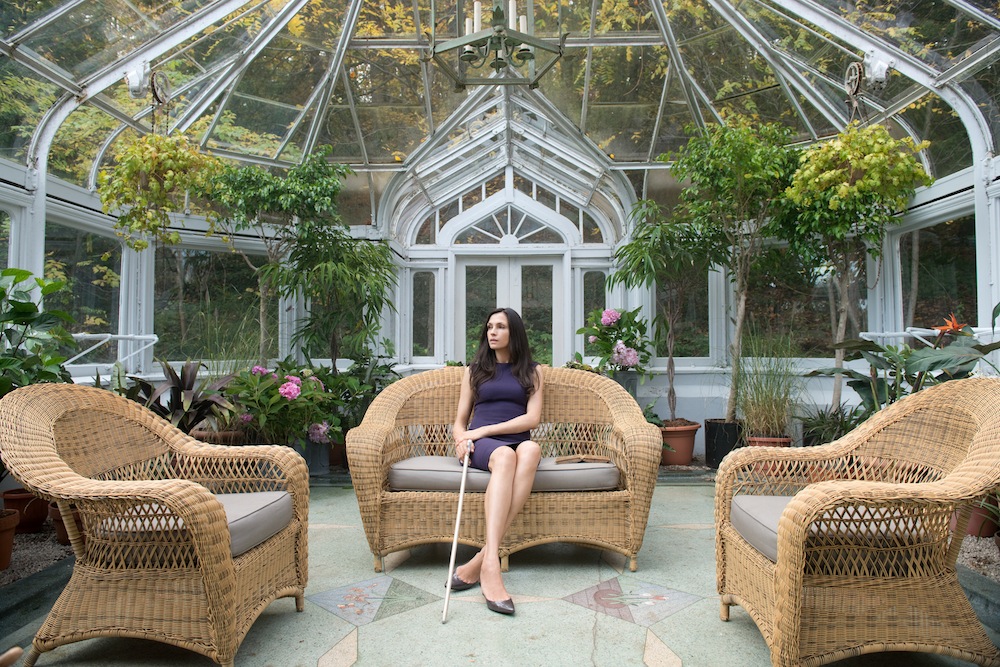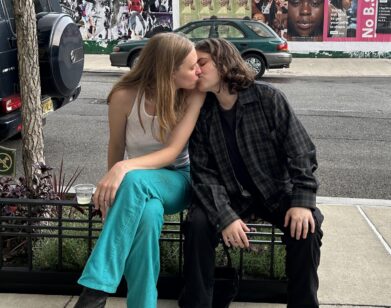Famke Janssen, In and Out of Character

ABOVE: FAMKE JANSSEN AS OLIVIA GODFREY IN SEASON TWO OF HEMLOCK GROVE. PHOTO COURTESY OF STEVE WILKIE/NETFLIX.
In the early ’90s, Famke Janssen flew to London to screen test for a Bruce Willis movie. She didn’t get the part, but she wasn’t devastated: agent-free and unknown, she’d never auditioned for a film before.
Now 48, Janssen, who grew up in the Netherlands, began her career as a model in New York when she was just 19. “I’ve always had some sense of gratitude of, ‘Here I am,’ ” she explains. “I’m someone who grew up in a small country, and I never had any of these big American dreams. Everything that’s happened is so much more than I ever could have imagined.”
Tall and beautiful with high cheekbones and brown eyes, Janssen risked being cast as an intimidating sexpot. Her breakout role was as a member of a Russian terrorist group who liked to strangle men using only her thighs in the James Bond film GoldenEye (1995). In Robert Rodriguez’s pulp teen movie The Faculty (1998) she played a timid teacher-turned-libidinous alien. But she’s also played a series of smart women, most notably Jean Grey in the X-Men franchise—a role she’s inhabited for almost 15 years.
As Olivia Godfrey in Hemlock Grove, Netflix’s consciously over-the-top horror series, Janssen combines both of these elements. The self-made matriarch of the wealthy Godfrey family, Olivia begins the show as a widow living in an ominous Pennsylvania mansion with her two children: Roman, whom she seems invested in, and Shelly, whom she doesn’t. She eclipses the other residents of her small town in every possible way: she is more beautiful, more mysterious, and more powerful. It is clear that Olivia doesn’t really belong there, that something sinister separates her from everyone else. “The longer you get to live with a character, the more they become part of you. But Olivia is so unique and out-there that I don’t have to worry about mixing it up with my own life,” jokes Janssen.
As it turns out, Olivia is a centuries-old upire (vampire). Her intentions, however, are less clear—whether her desire for self-preservation surpasses her professed attachment to her offspring (or at least Roman) and lover (Norman Godfrey, her former brother-in-law played by Dougray Scott). “Season One was really based on the novel. We set up a lot of different characters. It took us 13 hours to do it,” says Janssen. “In Season Two we completely strayed from the book. We took all these delicious characters and started peeling back the layers to see what was underneath it.” In the first episode of the season, which was released via Netflix on Friday, Olivia is in a weakened state, estranged from her children and with a limp from the Season One finale fight with her son. “A character like Olivia is mostly fueled by control and manipulation,” comments Janssen. “When that removed from her, how does she act?”
EMMA BROWN: How do you think Olivia sees herself? Does she think that she’s a good mother?
FAMKE JANSSEN: I tend to believe that people think that they do the best that they can, even people who commit the worst possible crimes in life, I don’t think they tend to look at themselves as evil or mean people. Olivia thinks that she’s doing the best that she can. In Season Two she’s willing to admit that maybe she hasn’t always been the best mother—but in the way that any parent tries the best they can, but they don’t always succeed.
BROWN: Do you think that she loves Norman?
JANSSEN: Very much. I think he loves her very much but they’re just two very similar characters who butt heads a lot. There’s a power struggle going on all the time and there’s an enormous sense of pride underneath all of it. Nobody wants to be the first one to say, “All I want is for you to love me.”
BROWN: It’s hard to measure improvement in something like acting—do you feel like you’re a better actress than when you started?
JANSSEN: It’s a very difficult profession and business. It is not a linear business. You can’t work your way up in the way one would do in most fields where you work hard and you get to the next level. Art is a roller coaster ride. It’s not a natural progression at all, sometimes you take two steps forward and you fall twenty feet back. That said, over the years—because I’ve been in the business for 20 years—I’ve [become] more comfortable on set. I understand character better. I understand how to conserve energy—not emote everything in the first take and try to keep it going for a while. All those little tricks over the years that you learn.
BROWN: What’s the best professional advice you’ve gotten?
JANSSEN: I worked with Patrick Stewart on an episode of Star Trek, and it was long before we ever did the X-Men series together. He said to me when I was very green in the acting department, “Instead of looking into both eyes, because you could see the eyes shifting back and forth, just look into one of my eyes.” And it was just the best acting advice. I had never realized a simple thing like that, because I’m sort of a self-made person. I decided one day I was going to act, and I took acting classes with an acting coach, but I never learned how to act specifically for camera. That’s probably the top advice, and the rest I’ve learned from doing everything my own way.
BROWN: If you could go back in time to when you first came to New York, what would you tell yourself?
JANSSEN: That it’s really not as scary as it all seems. I was so overwhelmed by New York when I first got there. Crossing the street, I thought people were going to shoot me. It just reminded me of movies, and all the movies that I had grown up with from America were super-violent. It took me forever to get out of the hotel room, and the hotel where I was put up turned out to be the fanciest hotel in the fanciest neighborhood on the Upper East Side, but I didn’t know that. I thought about all the violent movies I had seen. It all seemed very intimidating at the time.
SEASON TWO OF HEMLOCK GROVE IS NOW AVAILABLE TO STREAM ON NETFLIX.






